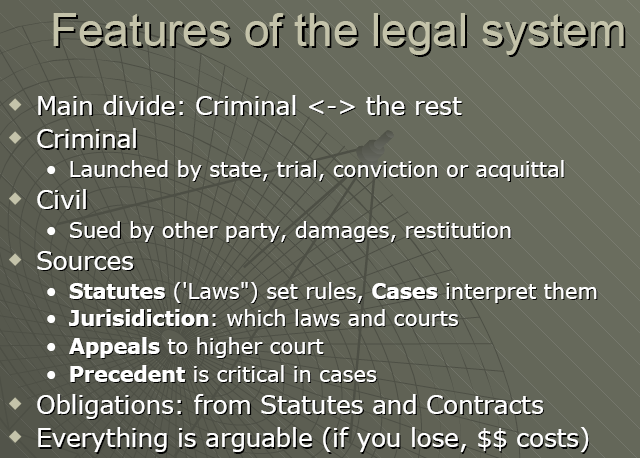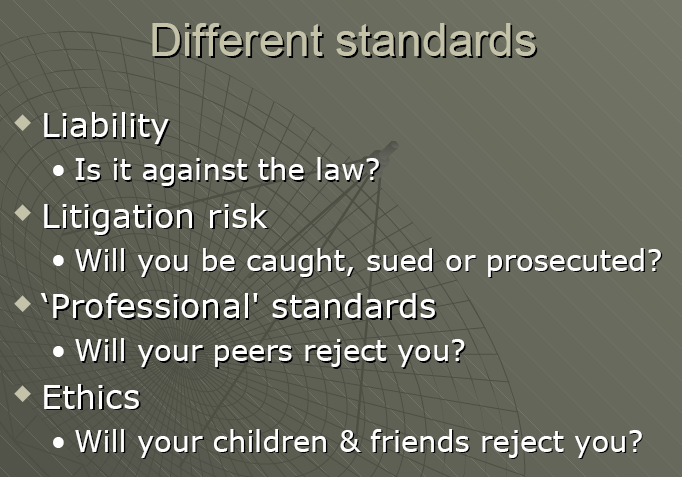I was looking forward to this talk by David Vaile since his name keeps popping up everywhere I go. So here are some rough notes I took down (and then expanded on some points now). His full slides can be found here.
This slide gives a nice overview.
 (David Vaile. Legal perspectives on system development)
(David Vaile. Legal perspectives on system development)
Lawyers can speak for clients (i.e. on their behalf). So you may want to be careful of what they are saying for you.
Cases are often about motivation. Why you did something. Your intent. Its not a whole science. eg. murder/manslaughter. did you intentionally push someone in front of a train, or did you slip and accidentally push them in front of a train. This can make a difference in a trial.
Criminal --> Beyond reasonable doubt. Civil --> Probability. Does not need to be beyond reasonable doubt.
Lawyer's will generally say "with respect I think you are wrong" rather than the direct "you are wrong".
Law exists to regulate. "It won't just work out itself [if we don't have laws]".
Courts can be expensive and risky. Going to court may not always be the best idea.
ASIC, ACCC... can step in sometimes. This strips away the companies advantage (lots of $$'s and lawyers) in a case against an individual.
"If you make something accessible in another country is that publishing in that country?" One court case says yes. I find this surprising. If you publish something on a web server in your country and allow all IP's to access your web pages then another country considers you publishing in that country??? Unfortunately Vaile didn't give the case reference for this (UPDATE: This is the case and here is a list of law journal articles referring to the case. I'll probably make another post once I get a chance to take a closer look at it).
Due to the free trade agreement its now illegal to copy even when allowed if you break the DRM.
Suing your customers --> turns them against your company! This builds a coalition of difference to try to change the law. The turning point is if that coalition is large enough. Could this mean that to win the copyright fight we must get the film studios to sue as many people as possible? I would hope not, and rather hope that people become aware of the current problems on their own accord not through legal action against them.
Litigation risk may change over time. You may do something now that has a low risk of litigation but in a year or so that may change. That minimal risk does not increase your chances of winning the case.
This slide from Vaile's talk is enlightening for me.
 (David Vaile. Legal perspectives on system development)
(David Vaile. Legal perspectives on system development)
Mainly because its so easy to fall through the top one that you forget there are layers underneath. Copyright laws is so tough and stupid its hard to convince yourself that you should not break them. You loose faith in the law and begin to not worry about anything. But the law is just one standard. Professional standards and ethics come into play. Let me look at some example cases.
|
Liability |
Litigation Risk |
'Professional' standards (will your peers & colleagues reject you?) |
Ethics (Will your children & friends reject you?) |
|
|
Murder |
Illegal |
High |
Yes (probably) |
Yes (probably) |
|
Copyright Infringement of a feature film to avoid paying |
Illegal |
Low |
Perhaps |
Perhaps |
|
Copyright Infringement of a feature film to transfer a purchased DVD to a portable device (prior to amendments) |
Illegal |
Very Low |
No (unlikely) |
No (unlikely) |
I think its just as important, if not more important to consider the bottom two standards (professional standards and ethics) than the top two (liability and litigation risk). These bottom two are still important even if you can get away with the illegal act.
Privacy. There are two interests here, the individual and the government.
|
The Individual. "I want to be left alone." |
242227954b0d84ba7550fd6e3d10b9d0 |
The Government. “What have you got to hide? Tell us.” |
|
US |
Australia |
|
|
Upper House |
Senate |
Senate |
|
Lower House |
Congress |
House of Representatives |
The Australian SPAM act has no private right to sue. Must rely on ACMA. The US CANSPAM act has private rights to sue.